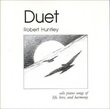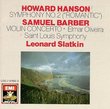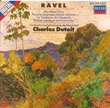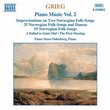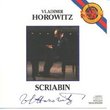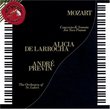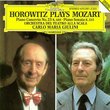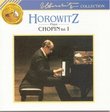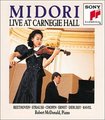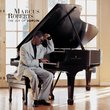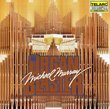| All Artists: Maurizio Pollini Title: Mozart: Piano Concertos K. 414 & 491 Members Wishing: 0 Total Copies: 0 Label: Deutsche Grammophon Original Release Date: 1/1/2008 Re-Release Date: 5/13/2008 Genre: Classical Styles: Forms & Genres, Concertos, Historical Periods, Classical (c.1770-1830), Instruments, Keyboard, Symphonies Number of Discs: 1 SwapaCD Credits: 1 UPC: 028947771678 |
Search - Maurizio Pollini :: Mozart: Piano Concertos K. 414 & 491
 | Maurizio Pollini Mozart: Piano Concertos K. 414 & 491 Genre: Classical
Here is the eagerly anticipated follow-up to Maurizio Pollini s acclaimed 2006 recording — of Mozart s Piano Concertos in G, K. 453 and in C, K. 467, in which he not only plays but — directs the nonpareil Vienna Philharmonic... more » |
Larger Image |
CD DetailsSynopsis
Product Description Here is the eagerly anticipated follow-up to Maurizio Pollini s acclaimed 2006 recording of Mozart s Piano Concertos in G, K. 453 and in C, K. 467, in which he not only plays but directs the nonpareil Vienna Philharmonic Orchestra. About that recording, The Times [London] stated: You hear a man in love...he plays Mozart with real feeling, leading us into the music s depth, its inner melodies, never content with the surface...the music always moves forward, developing, growing, with the subtlest range of colours...These are performances of conversational intimacy. When one is in love, one can never get enough, so Pollini has done it again: in summer 2007 he and the Vienna Philharmonic recorded the early, cheerful Piano Concerto in A, K. 414 and the famous C minor Concerto, K. 491, a mature work of brooding pathos. Once again, Pollini and the Vienna Philharmonic work without a conductor, in front of a live audience in Vienna s famous Musikverein, parlaying their deep mutual understanding and respect into one of the noblest and most profound Mozart experiences imaginable. Similar CDs
Similarly Requested CDs
|
CD ReviewsEnchantingly beautiful playing ... lucidly recorded ...simpl Peter B. Behr | New York, NY, USA | 07/14/2008 (5 out of 5 stars) "This is Maurizio Pollini's second CD playing Mozart piano concerts with the Vienna Philharmonic and conducting from the keyboard. The playing is enchantingly beautiful and the performances are lucidly recorded. The program was played on June 2 and June 3 in the Musikverein in Vienna. The evening program began with Mozart's Concerto No. 12 for Piano and Orchestra, A Major, KV 414. It was followed by Stravinsky's Octet for Wind Instruments; Hugo Wolf's Serenade G Major, "Italian Serenade"; and closed with Mozart's Concerto No. 24 for Piano and Orchestra, C Minor, KV 491. When I first listened to this CD, I found myself playing it through several times in a row. One friend with limited interest in classical music hear it, went out and bought a copy, and said he played it straight through 4 times as soon as he got home with it. Another friend, who is very particular about what she listens to, and drives quite far most days, says she has not taken the CD off her car's CD player. This is a very engaging set of performances. Pollini's playing is enchantingly beautiful, and luminously suffused throughout with deep and warm understanding, fine charm and lyrical wit. Pollini plays No 12/A Major/K 414 with Mozart's cadenzas. This easy and friendly concerto is rich in melodies and full of delightful inventions, even while following the formal concerto structure, and Pollini brings all this out in a lovely, lyrical way. No 24/C Minor/K 491 is sometimes referred to as dark or brooding. Darkly stirring would be a better description for what I heard in the opening passage work, and which characterizes much of this concerto. The contrasts between the dramatically shifting energy of the first and third movements and the reflective calm of the middle movement throw into relief each movement's complex character, while also underlying their coherence as a whole. It is simply spellbinding. Pollini's friend, Salvatore Sciarrino composed the cadenzas, which Mozart did not leave. Sciarrino brings the same ineffably good taste to his composition here as he did on Pollini's last Mozart CD - very different from Sciarrino's challenging contemporary compositions. The Vienna Philharmonic again is a good orchestral partner, and the recording and engineering quality are again very fine. Highly recommended, even for devotees of other pianists. This is a very special CD. " Mozart made as beautiful as possible (in a good way) Santa Fe Listener | Santa Fe, NM USA | 09/08/2008 (5 out of 5 stars) "We are long past the distorted fashion in which Mozart concertos used to be played, with a tinkly piano miniaturizing the solo part and a fattened Romantic orchestra playing on a totlaly different scale. Making Mozart sound civilized counted for too much, but now drama, contrast, and surprises count just as much. This, the second Mozart concerto CD from Pollini in a year (he waited years since his first foray with Karl Bohm as conductor in 1976), is suavely beautiful Mozart played on an elegant scale with every refined instinct that the famed pianist has at his disposal. Nor, to clear the air right off, is he glacial or clinical, two charges directed at Pollini by his detractors. The two chosen pieces stand on opposite sides of the great divide of 1784. The major concertos, starting with K. 449, come in or after that year, the lesser ones before. Concerto No. 12, K. 414, is melodic, winning, and uncomplicated, and praise goes to Pollini for not trying to dress it up. His reeading is unaffected but highly focused at the same time -- the magic of this pianist has always been that the music forms a single arc from beginning to end. The same holds true in the far more ambitious Concerto No. 24 K. 491, one of Mozart's deepest explorations into the noble melancholy of C minor (as an appendage, listen to the great Fantasia in C minor K. 396. My question going in was whether Pollini as conductor could express enough force and tension in the orchestral part. The answer is not quite. But as in the earlier CD from last year, he's enormously helped by the Vienna Phil. and its natural affinity for Mozart -- they do find enough depth. However, if you want marked dramatic contrast between soloist and accompaniment, it's not to be found here. Pollini prefers a melliflous surface, and beauty trumps drama. In the end, it would be hard to imagine a contemporary pianist who plays these two works with such finesse, so I will put all objections aside. The catalog has been dominated for years by period-style performances of Mozart, and anyone who can give us traditional Mozart without sounding heavy and dated is to be commended. Pollini does that and goes farther, reaching the frontier of the sublime, even if he doesn't cross over as fully as Clifford Curzon or Edwin Fischer." Cultured Mozart pianism Ivor E. Zetler | Sydney Australia | 09/15/2009 (4 out of 5 stars) "This live recording from Vienna presents two Mozart Piano Concertos played and conducted by Maurizio Pollini. The earlier work (No 12, K414) receives an interpretation that, to my ears, seems the less satisfying. While all the notes seem present and correct, I miss the exuberance expected of this youthful and outgoing work. Just listen to Radu Lupu on the recently rereleased Decca issue to hear how joyful and playful this music can sound.
Pollini seems to be more suited to the more serious Concerto No 24, K491. Here his playing and conducting is exemplary; it is one of the most satisfying performance on disc. Pollini's technique is never in question and the pianism is very stylish. Of course the Vienna Philharmonic could perform this repertoire in their sleep although here they sound appropriately alert. The recorded sound is warm and clear. Some moaning (faint and presumably from Pollini) is occasionally audible and the loud applause at the end of No 24 is distracting." |

 Track Listings (6) - Disc #1
Track Listings (6) - Disc #1
